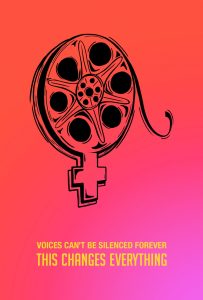“This Changes Everything” (2018 production, 2019 release). Cast: Marisa Tomei, Jessica Chastain, Reese Witherspoon, Natalie Portman, Chloë Grace Moretz, Meryl Streep, Zoe Saldana, Cate Blanchett, Gillian Anderson, Rashida Jones, Sharon Stone, Amandla Stenberg, Heather Graham, Rosario Dawson, Geena Davis, Mary-Louise Parker, Sandra Oh, Tiffany Haddish, Taraji P. Henson, Rose McGowan, Brit Marling, Ellen Pompeo, Amber Tamblyn, Yara Shahidi, Jackie Cruz, Lena Dunham, Marg Helgenberger, Tracee Ellis Ross, Judd Apatow, Alan Alda, Paul Feig, Shonda Rhimes, Jill Soloway, Patty Jenkins, Catherine Hardwicke, Mira Nair, Kimberly Peirce, Lesli Linka Glatter, Julie Dash, Lynne Littman, Maria Giese, Cherien Dabis, Courtney Kemp Agboh, Callie Khouri, Anita Hill, Kalpana Kotagal, Melissa Goodman, Maureen Ryan, Howard Rodman, Clifford Alexander. Director: Tom Donahue. Web site. Trailer.
Movies and TV shows are wonderful outlets for entertainment, information and enlightenment. They provide us with tremendous sources of inspiration and creativity, especially for younger impressionable viewers. But are they everything they truly can be? Are they serving the wants and needs of all the audiences out there? What’s more, are they making available opportunities for creative expression to everyone in the business? If one were to ask many women in the entertainment industry, their answers would likely be characterized by dissatisfaction, disillusionment and frustration. And, to learn where those feelings come from, one need only look to the practices and outlooks of the decision-makers in the business, revelations made loud and clear in the eye-opening new documentary, “This Changes Everything.”
The movie and television industries are replete with many talented women, both in front of and behind the camera. But are they all getting a fair shake when it comes to work opportunities? Moreover, when it specifically comes to on-screen appearances, are those that are available giving women enough chances to show what people of their gender can do?
As many prominent women in the business contend, the foregoing are important questions, because their answers have ramifications that extend far beyond their professional accomplishments. “This Changes Everything” takes a critical look at these issues, examining and statistically documenting the disproportionate number of jobs open to women in behind-the-scenes careers, such as directors, producers, showrunners and technical positions. Likewise, the picture does the same when it comes to comparing the number of available roles and the amount of allotted screen time for women compared to their male counterparts. It also shines a bright light on the limited range of roles in which women are typically cast, most of which are restricted to parts as girlfriends, sidekicks and victims in need of being rescued.
[caption id="attachment_10860" align="aligncenter" width="300"] Actress-producer Geena Davis discusses the disparity in opportunities for women in the film and television industries in the eye-opening new documentary, “This Changes everything.” Photo courtesy of Fathom Events.[/caption]
Actress-producer Geena Davis discusses the disparity in opportunities for women in the film and television industries in the eye-opening new documentary, “This Changes everything.” Photo courtesy of Fathom Events.[/caption]
Those in the industry who are concerned about the foregoing worry about the repercussions associated these issues, not just for those in the business, but also in society at large. Why? Because of the messages these practices send to viewing audiences, especially children. For instance, if young girls are only exposed to images of women who fall into the limited range of roles noted above, what does that tell them about who they are and what they can become in life? Those who might aspire to careers, callings or lifestyles different from the three options previously discussed may never discover that other possibilities exist simply because they don’t see any female role models depicted in those capacities or scenarios. And, given that our contemporary entertainment vehicles strongly define the nature of our culture, they carry tremendous impact on who we are, how we see ourselves and what we believe we’re capable of, particularly during our formative years.
To that end, the subjects interviewed for this film – including representatives of both genders – contend that women need more opportunities in the business to get their voices heard and their viewpoints expressed, not only because they have something to say creatively, but also to help play a greater role in shaping society’s outlooks (and thus the roles in which young women can see themselves). Those are some rather staggering implications, notions that are typically overlooked, either unconsciously or intentionally.
It’s somewhat ironic that these circumstances exist compared to the early days of Hollywood, when women were on a nearly equal footing with their male counterparts. During the Silent Era, women held many prominent roles as writers and directors, some of them wielding considerable influence and commanding lucrative contracts. However, by the time talkies began to be made in the late 1920s, things began to change. As Hollywood now had to build large, expensive sound stages, that called for hefty infusions of cash, a resource controlled by bankers, most of whom were men, and those finance men only wanted to deal with other men. That’s when the balance tipped to the male side, where it has stayed ever since.
[caption id="attachment_10861" align="aligncenter" width="300"] Veteran performer Meryl Streep observes how changing our entertainment changes our culture in the new documentary, “This Changes Everything.” Photo courtesy of Fathom Events.[/caption]
Veteran performer Meryl Streep observes how changing our entertainment changes our culture in the new documentary, “This Changes Everything.” Photo courtesy of Fathom Events.[/caption]
To be sure, there have been instances where women have stepped to the fore, achieving impressive accomplishments both as on-screen protagonists and behind the camera. However, progress has largely taken the form of fits and starts that have not been able to sustain themselves. Cinematic blockbusters like “Thelma & Louise” (1991), for example, made huge, temporary splashes, yet all the prognostications that such releases would change things from there on out failed to materialize.
So why have women been left out of the game? There are various reasons, such as an industry that operates on a “good old boys” mentality. Then there are largely ineffective professional policies, such as self-regulation to supposedly ensure equal opportunities, a largely toothless enforcement regime. Prejudices against women being unable to get the job done also run rampant, despite plenty of examples to the contrary, both on the big and small screens.
Perhaps the most insidious reason, though, is an unconscious bias against inclusion. When male decision-makers move forward with their projects, they automatically tend to think in terms of which men for which roles, both on- and off-screen. Because women receive no consideration, they don’t make the cut for these opportunities. And that is what leads to male-dominated entertainment vehicles, which brings us back to the aforementioned issue of exclusion in on-screen representation and the attendant lack of role models.
If all this weren’t enough, though, women also face more than their share of indignities at the hands of male colleagues. The sexual harassment allegations raised against industry bigwigs like Harvey Weinstein are well known, but these high-profile cases are just the tip of the iceberg. As one actress in the film notes, she had an experience during a shoot where a male professional suggested that she sit on his lap when going over the lines for a scene, a proposition to which she responded by asking, “Do you have Tom Hanks sit on your lap when running the lines with him?”
[caption id="attachment_10862" align="aligncenter" width="300"] Actress Taraji P. Henson speaks about the opportunities available for women in general, and women of color in particular, in the revealing new documentary, “This Changes Everything.” Photo courtesy of Fathom Events.[/caption]
Actress Taraji P. Henson speaks about the opportunities available for women in general, and women of color in particular, in the revealing new documentary, “This Changes Everything.” Photo courtesy of Fathom Events.[/caption]
The indignities go beyond that as well. All too often, men in the business seek to objectify their female counterparts, pressuring actresses to do things for their roles that are designed to fulfill their aspirations for what constitutes the ideal woman, one who is essentially defined by sexuality and nothing else. For instance, actress Chloë Grace Moretz recounts an incident from one of her early roles where she found padded bra inserts (crassly referred to as “chicken cutlets”) left in her dressing room to accentuate her bust line, a message intended to let her know that nature hadn’t endowed her sufficiently enough to fulfill the vision the filmmakers held for her. As a budding young actress, she added, one can imagine what this gesture did to her self-esteem.
All of the foregoing policies and practices have become so ingrained that they have turned into widely held beliefs, particularly among those who are gatekeepers and controllers of the purse strings. And those beliefs have subsequently fueled the manifestation of the reality that is Hollywood, a result not at all surprising in light of the power of the conscious creation process, the philosophy that maintains we materialize the existence we experience through these metaphysical building blocks.
However, despite the power of these driving forces, they are by no means fixed or unchangeable. There have been times over the years, for instance, when progress – though limited – has been made. Those instances show that change is indeed possible; the trick, however, is figuring out how to maintain it. And, with new tactics in the offing, women in the industry may well be on the verge of instituting practices that could alter the standard operating procedures, a change made possible by implementing new beliefs with different and sustainable outcomes.
[caption id="attachment_10863" align="aligncenter" width="300"] Actress-producer-director Natalie Portman discusses the limited opportunities available for women behind the camera, noting that she herself is one of the few female directors she has ever worked with, as seen in “This Changes Everything.” Photo courtesy of Fathom Events.[/caption]
Actress-producer-director Natalie Portman discusses the limited opportunities available for women behind the camera, noting that she herself is one of the few female directors she has ever worked with, as seen in “This Changes Everything.” Photo courtesy of Fathom Events.[/caption]
For example, many in the business firmly believe in the notion that “numbers don’t lie.” To that end, actress Geena Davis established the Geena Davis Institute on Gender in Media to quantify the opportunities available to women in the movie and television industries, a project aimed at statistically showing just how limited they really are. The findings of those studies, presented liberally throughout this film, bear out what most women in Hollywood have instinctively known for a long time. These results thus provide a powerful argument to counter the contentions of men in the business who mistakenly believe that more opportunities for women exist than there really are. With such numbers in hand, women like Davis observe that men can’t disregard these figures if they’re to be taken seriously.
Numbers involving dollar signs tend to speak especially loudly, yet there’s been a long-held belief in Hollywood that only men can generate financial windfalls. The film dispels that idea, however, by presenting examples set by movies like “Wonder Woman” (2017), an action-adventure picture showcasing a female protagonist (Gal Gadot) and directed by a woman (Patty Jenkins), and the television shows created by Shonda Rhimes, executive producer of Grey’s Anatomy, Scandal and How to Get Away with Murder, all of which feature formidable women characters. These vehicles have been cash cows for their respective organizations, positively obliterating the conventional wisdom about what creative women are able to accomplish.
Davis’s organization also focuses specifically on fostering opportunities for creatives who seek to eliminate gender bias in entertainment vehicles aimed at children 11 and under. This is an effort that embodies the previously discussed notion that changing the programming that changes the message can change the culture. And that goal is attainable by changing who creates those entertainment vehicles in the first place.
According to the film, there’s evidence that backs this up, too, a phenomenon known as “the CSI effect.” Actress Marg Helgenberger, a cast member of the long-running television show CSI: Crime Scene Investigation, a series focused on forensic police investigation techniques, notes that, after appearing in more than 260 episodes, she had such an impact on young female viewers that the number of women who enrolled in this field of study swelled dramatically. Admittedly, this evidence is somewhat anecdotal, but its significance can’t be ignored.
[caption id="attachment_10864" align="aligncenter" width="300"] Television star Yara Shahidi discusses the opportunities for women newcomers in the business in “This Changes Everything.” Photo courtesy of Fathom Events.[/caption]
Television star Yara Shahidi discusses the opportunities for women newcomers in the business in “This Changes Everything.” Photo courtesy of Fathom Events.[/caption]
These initiatives, the product of inspired thinking and beliefs, are designed to help push past the barriers that have held women back. They show that limitations can indeed be overcome. Thanks to the notions espoused by efforts such as these, as well as those of other enterprises like the #MeToo movement, the tide at last seems to be turning. It may not be happening fast enough for some, but the momentum does seem to be carrying it forward, surpassing the stalling points that occurred with many efforts of the past. With the continued efforts of those behind these movements, sustained co-creative input from all of their participants and firmly rooted beliefs in what is truly possible, there’s no telling what might happen. This really could change everything.
This eye-opening look at the creative and managerial under-representation of women in the motion picture and television industries scathingly exposes a disparity in the business that’s been far more egregious than most of us were probably aware of. The film’s star-studded array of interviews with performers, directors, producers, showrunners, talent agents and others is truly impressive, as is its selection of clips from a wide range of movies and TV shows. The war stories from such veteran performers as Marisa Tomei, Jessica Chastain, Reese Witherspoon, Natalie Portman, Meryl Streep, Cate Blanchett, Gillian Anderson, Sharon Stone, Geena Davis, Mary-Louise Parker and Sandra Oh, as well as comparative newcomers like Tiffany Haddish, Taraji P. Henson, Yara Shahidi, Jackie Cruz and Chloë Grace Moretz, speak volumes, revealing a pattern of policies and practices sorely in need of reform. Except for an important (but decidedly overlong) segment about a decades-old lawsuit that was initiated to correct these issues among Hollywood directors, the picture is solid across the board, shining a bright light on one of the entertainment industry’s dirty little secrets – one whose societal and cultural implications extend beyond just what amuses us.
“This Changes Everything” may be a little difficult to find, at least in the near term. The picture has been playing at a number of film festivals and was the subject of a national one-night-only theatrical presentation by Fathom Events on July 22. However, the film will be available on DVD and video on demand in October. It’s truly worth the wait.
Holding back an inspired creative force is ultimately like trying to stop a tsunami. Sooner or later there will be a breakthrough, and, for women in the entertainment business, it would appear that such an inevitability is on the brink of happening. This is a welcome and refreshing change, one that can only make an impressive industry even more vital and vibrant. And, for move lovers like me, that can’t happen soon enough.
Copyright © 2019, by Brent Marchant. All rights reserved.
Monday, July 29, 2019
‘This Changes Everything’ examines remedies for a glaring disparity
Subscribe to:
Post Comments (Atom)

No comments:
Post a Comment